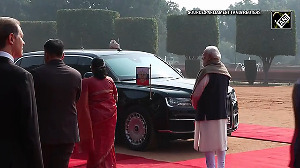Prisoners facing death row in Pakistan, including Indian national Sarabjit Singh, are likely to get a reprieve with the government "actively considering" a proposal to convert capital punishment into life imprisonment.
"A summary prepared by the interior ministry is at an advanced stage and a final decision is expected within a few days," a source was quoted as saying by the Dawn newspaper.
The source said a "major beneficiary" of the move would be Sarabjit Singh, who was convicted of allegedly carrying out four bomb attacks in Punjab province that left 14 people dead.
Sarabjit's execution had been set for April 1 after the rejection of his mercy petitions by the Supreme Court and President Pervez Musharraf.
But later, Musharraf delayed his execution for a month after receiving a fresh appeal from India so that Pakistan's new government could review his case.
The condemned Indian prisoner's family, which is currently in Pakistan to meet him, had separately sent a clemency appeal to Musharraf that is also currently with the government.
Sarabjit's wife Sukhpreet Kaur, daughters Swapandeep and Poonam, his sister Dalbir Kaur and her husband Baldev Singh have been lobbying government officials and politicians to secure his release.
They have insisted he is an innocent farmer who strayed across the border in inebriated condition in 1990.
Foreign Office spokesman Mohammad Sadiq too had said on Thursday that the government was considering the Indian government's appeal for clemency for Sarabjit and a decision would be taken in "due course".
Sources said certain parameters would be fixed to determine the eligibility of cases for commutation of death sentences.
Pakistan is currently ranked second in the world by Amnesty International for the number of convicts facing death.
It has over 7,000 prisoners on death row in jails across the country.
Executions too have increased over the years. Last year witnessed 134 executions, compared to 83 in 2006, 52 in 2005, 21 in 2004 and 18 in 2003.
The ruling Pakistan People's Party has been traditionally soft on the issue of death sentences.
Executions during the tenures of former PPP governments were rare. Slain PPP chairperson Benazir Bhutto had pardoned a number of convicts in 1988.
In 1970, the first PPP government led by late Zulfikar Ali Bhutto enhanced life sentence to 25 years from 14 years with the idea that the capital punishment would be abolished in years to come.
However, this did not materialise and the regime of late Gen Zia-ul-Haq kept both the death penalty and the increased life sentence intact.





